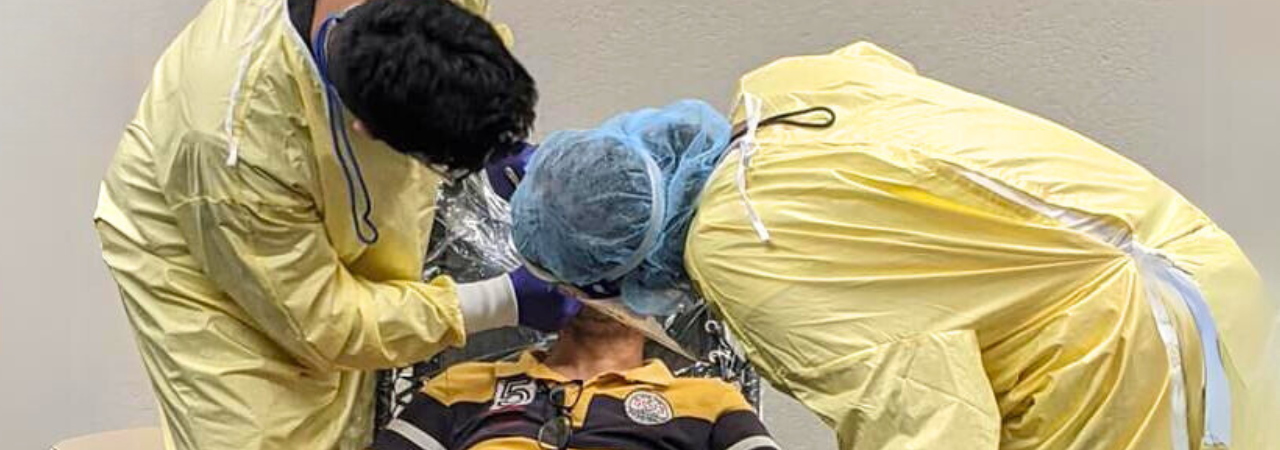Empowering Afghan refugees through dental assisting

When Afghanistan fell to the Taliban in 2021, thousands of people fled the tumultuous country. Many Afghan refugees resettled in Arizona, creating an urgent need for support services to help individuals acclimate and find jobs. The Refugee and Immigrant Community Empowerment Center (RICE) in Phoenix plays an instrumental role in filling service gaps for refugees after the 90-day resettlement period.
“Our main mission is to serve the refugee and immigrant community, whether it’s through economic security, advanced training and skills, or even things like ESL classes, to help them adapt to the U.S. and integrate into our society,” says Viashen Moodley, RICE’s director.
Among the organization’s services is a free dental clinic, hosted in partnership with Arizona Health Outreach, which has delivered more than $100,000 of emergent or preventive dental care services to 265 refugees over the past three years. With support from local government officials, RICE staff and volunteers saw an opportunity to offer dental assisting education at no cost to newly resettled Afghan refugees.
“We wanted a program that focused on more than just basic, entry-level jobs for the refugee immigrant community, allowing a higher level of skills development that serve our other missions,” Moodley says.
Making an impact in the classroom and the clinic
The 12-week RICE dental assisting program is led by a team of oral health professionals, including Tecian Musafiri, M.D., instructor; Bharet Patel, D.D.S., clinical director and preceptor; and Jida Wakili, clinical instructor and dental assistant. The program’s curriculum, which uses education materials from the DALE Foundation, integrates classroom learning with clinical work to enhance the learning experience.
“It’s good to have both the practical and the theory — once you discuss the theory, you have to show them how it works,” says Musafiri. “We are trying to have all necessary materials and treatments so that we can combine it, having the best of the academic and the practical.”
Students participate in a dental assisting externship with Patel and Wakili, where they are required to complete 80 hours in the clinic. “They are thrilled with the clinical aspect when they can put real knowledge into practice,” says Patel.
Setting students up for success
Many students do not speak English, so language barriers can present challenges. Wakili, a native of Afghanistan, has been in the students’ shoes — she now plays a critical role in the clinic as an instructor and a translator.
“They all want to learn and have questions, so I try to tell them in English or in my language,” she says. “It’s a little hard for the students, but this program is a good opportunity for them to learn and they are really trying.”
Patel is also impressed with students’ dedication to the dental assisting program and their ability to overcome obstacles. “It’s good to see them excelling and being successful,” he says. “They don’t speak a lot of English, but they’re smart and they are really fast learners.”
Since its inception in 2022, the RICE dental assisting program has graduated 14 students. The program helps set them up for success, with alumni currently working as dental assistants or pursuing additional education.
“We have a couple of dental assistants who we were able to connect to other dental practices in the area,” says Moodley. “There are some students who are pursuing bachelor’s or master’s degrees at Arizona State University and the University of Arizona. The nice thing is they’re not working entry-level jobs; they are working as dental assistants while in college.”
A community ripple effect
Job training is a primary goal of the RICE dental assisting program, but the greater refugee community is also positively impacted by the program. Dental assisting students are equipped with critical oral healthcare information to share with family and friends, which can help improve health outcomes in their community.
“We have a big community of refugees from Afghanistan, and not all of them are aware of oral health,” says Musafiri. “Once they get enough knowledge about dentistry, these dental assistants can help educate their families and encourage them to see a professional.”
RICE’s dental assisting program also makes a positive impact on the community through representation. When the free clinic is staffed by dental assistants who are refugees, they can provide comfort to patients from similar backgrounds and validate their experience.
“One of our main goals in setting up this program is that immigrants would be able to see other refugees in the free clinic. Wouldn’t it be empowering to see people like them treating them?” says Moodley. “That’s an initiative we’re working on right now, to have the dental assisting students participate more in the free clinic.”
RICE’s services are vital to the Phoenix-area refugee community, and its dedicated staff and volunteers have plans to reach even more people. In addition to expanding the dental assisting program, they hope to offer training in other healthcare specialties, such as medical assisting. By empowering refugees through education and skills training, RICE is making a lasting impact on both individuals and communities.
“By making somebody part of the community, they can fulfill their dreams,” says Patel. “With all those aspects, I think that’s the best part of the program — to help people from getting lost in the in the system.”
To learn more about RICE and opportunities to partner with their dental assisting program, visit www.riceaz.org or contact [email protected].

